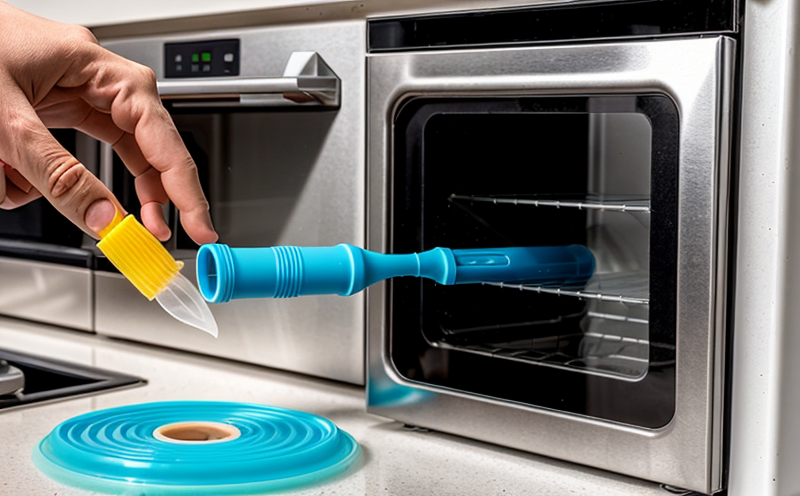ASTM D792 Density and Specific Gravity Testing of Household Plastics
The ASTM D792 standard is widely recognized as a fundamental method used to determine the density and specific gravity of household plastics. This test is crucial for ensuring product quality, compliance with industry standards, and meeting regulatory requirements.
Understanding the density and specific gravity of household plastics allows manufacturers to optimize materials, improve product performance, and ensure safety. The test results are essential for various stakeholders including quality managers, compliance officers, R&D engineers, and procurement teams who need reliable data to make informed decisions.
The ASTM D792 method involves measuring the mass of a specimen at a specified temperature in air and then in a solvent of known density. From these measurements, the relative density or specific gravity is calculated. The test can be conducted on various types of household plastics such as polyethylene (PE), polystyrene (PS), and polypropylene (PP).
For accurate results, proper specimen preparation is critical. This includes cutting specimens to standard sizes, ensuring they are free from contaminants, and drying them at a specific temperature if necessary. The testing apparatus used typically consists of an analytical balance with a resolution of 0.1 mg or better, along with suitable containers for the solvent.
The test procedure is standardized in ASTM D792 to ensure consistency across laboratories worldwide. Compliance with this standard is essential for laboratories aiming to provide credible and reliable results. By adhering to these procedures, Eurolab ensures accurate and consistent testing outcomes.
Understanding the significance of density and specific gravity in household plastics helps stakeholders appreciate why this test is vital. For instance, it allows manufacturers to ensure their products meet customer expectations regarding weight and volume, which can impact shipping costs and overall product performance.
Scope and Methodology
| Parameter | Description |
|---|---|
| Test Specimen | Type: Household plastics; Preparation: Cut to standard dimensions, free from contaminants. |
| Temperature Control | Specified temperature for mass measurement in air and solvent. |
| Balance | Resolution: 0.1 mg or better. |
| Solvent | Type: Known density, used to determine specific gravity. |
The ASTM D792 method is designed to provide accurate and reliable measurements of the density and specific gravity of household plastics. The test involves precise measurement techniques that are essential for quality control and regulatory compliance.
By following these standardized procedures, Eurolab ensures that each test adheres strictly to industry best practices. This consistency leads to trust among stakeholders who rely on Eurolab’s testing services for critical decisions regarding product development, manufacturing processes, and material selection.
Eurolab Advantages
At Eurolab, we pride ourselves on delivering excellence in household plastics density and specific gravity testing. Our experienced team of technicians and scientists ensures that every test is conducted with precision and accuracy. We use state-of-the-art equipment to provide reliable results that meet or exceed industry standards.
Our commitment to quality extends beyond just the testing process. We offer comprehensive support services, including consultation on specimen preparation, interpretation of results, and recommendations for material selection. This holistic approach helps our clients make informed decisions with confidence.
We also prioritize compliance with relevant international standards such as ASTM D792, ensuring that all tests are conducted in a way that meets the highest regulatory requirements. Our laboratories are accredited to ISO/IEC 17025:2017, which guarantees our clients peace of mind knowing they are working with a reputable and reliable partner.
With Eurolab, you can trust that your household plastics density and specific gravity testing will be performed by experts who understand the importance of these measurements in product development and quality assurance. Our services not only enhance product performance but also contribute to environmental sustainability by ensuring efficient use of resources.
Customer Impact and Satisfaction
- Enhanced Product Quality: Accurate density and specific gravity measurements ensure that household plastics meet the highest quality standards.
- Regulatory Compliance: Ensuring adherence to industry and regulatory requirements through consistent testing processes.
- Informed Decision-Making: Providing reliable data for R&D engineers, quality managers, and procurement teams to make informed decisions.
- Efficient Resource Use: Optimizing material selection based on test results leads to more efficient use of resources and reduced waste.
- Environmental Impact Reduction: By ensuring that household plastics are manufactured with precision, we contribute to reducing environmental impact.
Customer satisfaction at Eurolab is our top priority. We strive to exceed expectations by delivering accurate, reliable results in a timely manner. Our commitment to excellence has earned us a reputation as a trusted partner for quality assurance and compliance testing.





